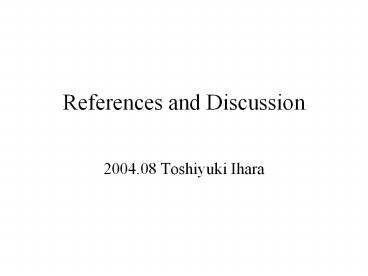References and Discussion - PowerPoint PPT Presentation
Title: References and Discussion
1
References and Discussion
- 2004.08 Toshiyuki Ihara
2
References
1Akiyama et. al. , Solid State Communications 122
(2002) 169 1D doped T-Wire / density dependence
of PL / X,X-,plasma emission / PL weak
FES 2Takagiwa et. al. , JPCS 63 (2002)
1587 Theory 2DEG / density dependence of FES
in absorption spectra / X,X-,Continuum 3Laruelle,
PRB, 65 (2002) 195303 1D doped LSL / PL at high
density / strong FES by Fano resonance 4Laruelle,
PRB, 65 (2002) 195302 1D doped LSL / PL and PLE
at high density / Moss-Burstein shift / no 1D
features 5Kapon, Physica E, 11 (2001) 224 1D
doped V-groove / PL, PLE at high density / PL FES
(?) / PLE weak FES (?) 6Kaur, phys. Stat. sol. A
178,465 (2000) 2D doped 10nm well / density
dependence of PL, PLE / X,X-,continuum /
FES 7Yusa, PRB 62 15390 (2000) 2D doped 20nm
well / density dependence of PL,photocurrent /
X,X- / FES of X 8V. Huard, PRL 84 (1999) 187 2D
CdTe doped 10nm well / density dependence of
absorption / X,X- / w2-w1EFEb 9Kim, Physica E7
517 (2000) 1D doped v-groove / PL / FES at
n2 10Brown, PRB 54 (1996) R11082 2D doped 5nm
well / density dependence of absorption / X,X-
but hard to resolve 11Finkelstein, PRL 74 (1995)
976 2D doped 20nm well / density dependence of
PL,PLE / X,X-,plasma 12Sekiyama, PRB 51 (1995)
13899 Cu salt / PL / Fermi-liquid or
Luttinver-liquid 13G.D Mahan, Phys. Rev. 153
(1967) 882 Theory 3D Metal / x-ray absorption
/ power-law divergent in absorption
spectra 14Hawrylak, Phys. Rev. B44 (1991)
3821 Theory 2D electron system / emission,
absorption / X, X- / power-law divergent 15Noziere
s et al. Phys. Rev. 178 (1969) 1097 Theory 3D
metal / x-ray absorption / reduced FES by
Anderson infrared catastrophe 16Combescot, J.
Phys. (Paris) 32 (1971) 1097 Theory 2D
electron system / absorption of X, continuum /
power-law divergent
3
Reference
Akiyama et. al. , Solid State Communications 122
(2002) 169 Takagiwa et. al. , JPCS 63 (2002)
1587
4
Reference
Laruelle, PRB, 65 (2002) 195303 Laruelle, PRB, 65
(2002) 195302
5
Reference
Kapon, Physica E, 11 (2001) 224
6
Reference
Kaur, phys. Stat. sol. A 178,465 (2000)
7
Reference
Yusa, PRB 62 15390 (2000) V. Huard, PRL 84 (1999)
187
8
Reference
Kim, Physica E7 517 (2000) Brown, PRB 54 (1996)
R11082
9
Reference
Finkelstein, PRL 74 (1995) 976
10
Reference
Sekiyama, PRB 51 (1995) 13899
11
Reference
Hawrylak, Phys. Rev. B44 (1991) 3821
12
abstract
???n??????T????? ???????????????? PLPLE?????????
? ??????2??????PLPLE?????? 1???????FES??????(??
??????w1??(trion)??????w2?????(exciton?)???) ????
??FES???(1D??????????????)??????(????1D???)?? 1D?
??excitontrion??????2D??w1,w2?FES??????????? Tri
on???????????????????????FES????????????? Trion?bi
nding energy?1D?????? 2meV / 1.5meV
We measured PL and PLE spectra in an n-type doped
T-shaped quantum wire (T-wire) of superior
quality, where the electron density (n1D) is
tuned by applying gate voltage. We found
interesting differences between one-dimensional
(1D) and 2D electron systems by comparing the
spectral features of 1D quantum wire with that of
2D quantum well which is measured in the same
T-wire sample. In the 2D well, we observed the
smooth evolution from the trion peak at low n2D
to fermi-edge singularity (FES) at high n2D,
which is analogous to results reported for 2D
well by other groups. In the 1D wire, we observed
strong FES of trion peak which disappears at high
n1D. In addition, we found rapid decay of exciton
peak with n1D, large trion binding energy in the
1D wire, that might be the characteristic
features in 1D system.
13
Figure
14
Figure
15
Discussion






























